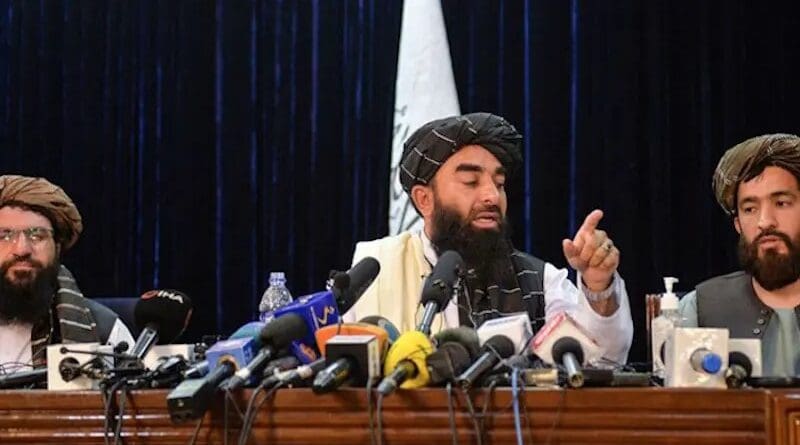The Uphill Battle: Why The Taliban Hasn’t Legitimized Their Rule In Two Years – OpEd
By Anwar Iqbal
The return of the Taliban to power in Afghanistan had marked a significant turning point in the country’s tumultuous history. As they assumed control once again, there was a critical aspect that the Taliban struggled to attain: legitimacy. The international community and many Afghans questioned the group’s rule due to a range of issues, including their harsh policies, concerns about inclusivity, economic challenges, and allegations of human rights abuses.
Factors Contributing to the Lack of Legitimacy
A. Harsh and Restrictive Policies
The Taliban’s rule in Afghanistan was characterized by strict and repressive policies, particularly towards women and freedom of expression. The suppression of women’s rights, including their access to education and participation in public life, garnered significant international criticism. These policies created an image of the Taliban as regressive and oppressive, diminishing their legitimacy.
B. Concerns about Inclusivity
Another major challenge for the Taliban’s legitimacy was concerns about inclusivity. Afghanistan is a diverse country with various ethnic and religious groups. Many feared that the Taliban’s government would not adequately represent or protect the rights of minorities. The absence of ethnic and religious diversity within the government raised doubts about the Taliban’s commitment to an inclusive Afghanistan.
C. Economic Challenges and Poverty
The Taliban inherited an economy in turmoil. High inflation, economic instability, and a lack of basic services affected the livelihoods of ordinary Afghans. The dire economic situation contributed to widespread poverty and discontent among the population, undermining the Taliban’s legitimacy as a governing authority.
D. Human Rights Abuses
Reports of human rights abuses under the Taliban’s rule further eroded their legitimacy. Allegations of violence, retribution, and extrajudicial executions created an environment of fear and insecurity. The perception that such abuses were carried out with impunity damaged the Taliban’s image both domestically and internationally.
International Community’s Response
A. Sanctions and Diplomatic Isolation
The international community responded to the Taliban’s return by imposing sanctions and diplomatic isolation. Western countries, including the United States and European nations, took measures to isolate the Taliban regime. United Nations resolutions further cemented this stance, signaling a lack of recognition for the group’s authority.
B. Aid and Humanitarian Assistance
Despite the diplomatic isolation, efforts were made to provide humanitarian aid to alleviate suffering among Afghans. Balancing the provision of aid with conditionality became a complex challenge for the international community. While aid was desperately needed, donors sought to ensure it did not inadvertently support the Taliban’s rule.
Taliban’s Attempts at Legitimization
A. Outreach Efforts
To gain recognition and support, the Taliban engaged in diplomatic efforts and outreach with neighboring countries. They sought to establish relationships with nations like China, Russia, and Pakistan. These diplomatic initiatives aimed to present the Taliban as a legitimate government on the international stage.
B. Rhetoric on Inclusivity and Moderation
The Taliban made public statements about inclusivity and moderation. They promised a more inclusive government, which included some non-Taliban figures. Additionally, they claimed to have adopted a more moderate approach, emphasizing that they would not seek revenge against those who had opposed them in the past.
Challenges Ahead
A. The Role of the Afghan People
The resistance and opposition within Afghanistan played a significant role in challenging the Taliban’s rule. Various factions and groups emerged to resist the Taliban, particularly in the Panjshir Valley. The Afghan people’s determination for change and their grassroots efforts could shape the future of the country.
B. Balancing International Interests
The international community faces a delicate balancing act between geopolitical interests and humanitarian concerns. How the world engages with the Taliban-led government will have profound implications for regional stability and Afghanistan’s future. Striking the right balance is a complex task.
Conclusion
In their two years of rule, the Taliban encountered substantial obstacles in their quest for legitimacy. Their harsh policies, inclusivity concerns, economic challenges, and human rights abuses created doubts about their ability to govern effectively. The international community’s response, marked by sanctions and humanitarian aid, reflected the complex dynamics of dealing with the Taliban. As Afghanistan navigates its path forward, the role of the Afghan people and the challenges of balancing international interests will be instrumental in determining the nation’s future and its legitimacy on the global stage.

